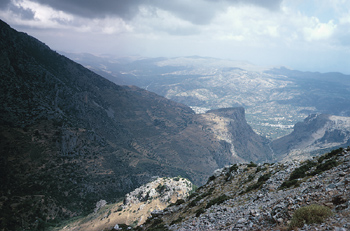Mar 15 2005
 Recently scientists have been trying to isolate the cultural and genetic factors behind the ability to adapt and to survive extremes of altitude and cold, of which Tibetans have a legendary reputation conditioned by the extreme environment of the Tibetan plateau and they have discovered a gene which improves oxygen saturation in hemoglobin.
Recently scientists have been trying to isolate the cultural and genetic factors behind the ability to adapt and to survive extremes of altitude and cold, of which Tibetans have a legendary reputation conditioned by the extreme environment of the Tibetan plateau and they have discovered a gene which improves oxygen saturation in hemoglobin.
Tibetan children who grow faster than other children up to the age of five presumably do so as a defense against heat loss since larger bodies have a more favorable surface to volume ratio. The Tibet Paleolithic Project is studying the Stone Age colonization of the plateau, hoping to gain insight into human adaptability in general and the cultural strategies the Tibetans developed as they learned to survive in this harsh environment.
A new study from Greece is pursuing a similar train of thought with not dis-similar findings. The findings are reported in the Journal of Epidemiology and Community Health.
People who live in mountain areas live longer than those living in lowland areas, according to research from Greece, which has the lowest death rate from heart disease of any developed country.
A study started in 1981, which tracked the cardiovascular health and death rates of 1150 inhabitants of three villages not far from Athens, collected information on risk factors, including gender, age, weight, smoking habit, blood pressure, and alcohol consumption. They used the data taken over 15 years to build up a profile of the biochemical health of the villagers; blood samples were also taken.
One of the villages is in a mountainous area 1000 metres above sea level; the other two are on the plains. The livelihoods in all three villages are similar - farming and animal husbandry for the men and housework for the women. Overall, both men and women living in the mountain village had higher rates of circulating blood lipids and higher blood pressure and a worse coronary heart disease risk profile than their peers living in the lowland area.
In 1996 the researchers assessed the number of survivors over the 15 years, 150 men and 140 women died. Of these, 67 deaths, 34 of which were among the men, were attributable to coronary heart disease; after taking account of all the cardiovascular risk factors, mountain village residents had lower death rates, and lower rates of death from heart disease, than their peers in the lowlands and this was more so among the men.
The conclusion reached was that other 'protective factors' must be in action as blood lipids and blood pressure were higher among the mountain residents. It appears that living at moderately high altitude produces long term physiological changes in the body enabling it to cope with lower levels of oxygen, and this, along with the exertion required to walk uphill regularly on rugged terrain, could give the heart a better work-out.